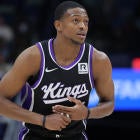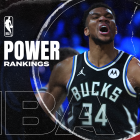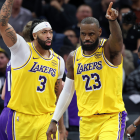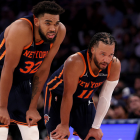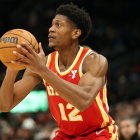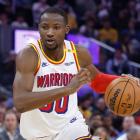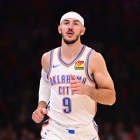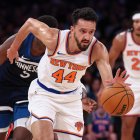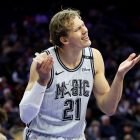For a guy who turned 31 last season, Chris Paul continued to thrive for the Los Angeles Clippers. Paul, who has had the meniscus in his left knee removed --which prompted him to start resting significantly during the regular season over the past four seasons-- played in 74 games, averaging 19 points per game along with 10 assists, shooting 46 percent from the field and 37 percent from 3-point range. He helped keep the Clippers afloat and in line for homecourt in the first round when Blake Griffin went down.
He finished fourth in assists per game, third in steals per game, 5th in PER, 1st in assist percentage, 7th in win shares and 8th in value over replacement player.
He was pretty great. He showed no signs of slowing down. He remains, in the purest sense of the term, the Point God.
Yet it's difficult to examine the career of Chris Paul and where it stands in 2016 without feeling like we're watching a movie in which we already know the ending. Is Paul destined to go down as the great player who never, really, even came close to a title? Will this, over time, take him farther and farther away from the conversation of greatest point guards of all time?
This sounds ridiculous, even to his detractors. Paul is so good, and has been so good over the past 10 seasons, that to suggest in time his standing will fade to such a degree seems crazy. That said, there are people who currently view him this way -- the great player who's never won a title. No nuance. No context. Just, "he never won a title, so he's not great." That's it. Over time, that kind of cynicism and superficial evaluation only tends to increase, and consequently, credibility ends up going the opposite way.
THE STRUGGLE
Paul is often saddled with the responsibility for his team; that's normal, it happens to every superstar. This column from CBS Sports looked at the similarities between Paul and Carmelo Anthony, wondering why Paul has never been treated with the same level of scorn that Anthony has had to endure.
This, however, misses the one very fundamental difference which is that there's nothing you can point to and say Paul should've done that better, except "win the game." With Anthony, you can point to his defense, his ball-dominant approach, the way that he never embraced his teammates' roles. (It says a lot that last year, when the Knicks were abysmal, everyone lauded Anthony for "really trying to pass for the first time.")
You never watched a playoff series with Paul and said "He didn't do enough." As for why we ascribe wins and losses to an individual despite all of his contributions to the contrary is beyond me. There's no reason for it. Still, you can't get past the numbers. Paul is 0 for 3 in the second round. He's never even been to a conference finals. And on some level, that's that. How did this happen?
- In 2012, the Clippers upset Memphis and were throttled by a superior Spurs team. The Clippers just weren't ready.
- In 2013, they lost to Memphis in a revenge game. Paul was good, but too often deferred instead of punishing the Grizzlies for wanting to make him a scorer. This one was on him as much as it was Blake Griffin (who was really beat-up by the Grizzlies' size).
- In 2014, Paul made a series of mistakes in crucial games of a tight, tough series vs. the Thunder. He also averaged 22.5 points and 11.8 assists while shooting 50 percent from the field. The Clippers outscored OKC by 10 points per 100 possessions with Paul on the floor, and that series was the subject of a series of highly controversial calls -- a good sign for how close it was. Paul had mistakes, but you don't point to him like you do, say, LeBron James in the 2010 loss to the Celtics.
- Then there's 2015. Choose your narrative! Paul collapsed vs. the Rockets after the Clippers led 3-1. Complete ignominy. In that series, he averaged 21 points, 10 assists, 1.6 steals, shot 47 percent from the field, and 40 percent from 3-point range. The Clippers outscored the Rockets by 19 points in the five games he played in that series.
Why did he only play five games? People forget this but he suffered a significant hamstring injury vs. the Spurs, and missed the first two games vs. the Rockets. Paul played on that injured leg in Game 7 vs. San Antonio, and made the game-winning shot over Tim Duncan. If that series happens in the WCF, Paul is a legend. But instead, Josh Smith dropped four 3-pointers in Game 6. Weird things happen. Sports.
- Finally there's 2016, when Paul suffered a broken hand and Blake Griffin re-aggravated his leg injury the same day that it was revealed Curry would miss two weeks with his sprained knee. The window for the Clippers opened and shut permanently in the span of 24 hours.
So, to recap, we've got 2012: Clippers not ready; 2013: legit got beat by Memphis; 2014: tough series vs. Kevin Durant and Westbrook; 2015: injury and a fluke collapse vs. a not-great Houston team; 2016: injury.
I have the same reaction you do to this, most likely. "OK, but eventually it can't all be a series of coincidences and bad luck. Eventually there's a pattern."
Except, why do we assume that? Each series exists in a vacuum. Matchups, personnel, every series is different. In truth, Paul has only lost a handful of series in his career when he was actually on the better team. This is sort of akin to blaming LeBron James for the Heat's loss to the Spurs in the 2014 Finals -- in which LeBron averaged 28 points, 8 rebounds and 4 assists on 57 percent shooting from the field and 51 percent from three. The Spurs were simply brilliant that series. The better team. They hardly missed a shot. Maybe as close to a flawless performance as we've ever seen in a Finals.
What more, really, could LeBron have done?
In most cases, you can say the same thing about Paul in his team's playoff defeats. No, he's never been as good as LeBron was in that series. Few people have, if any. But he's been great in his own right, and while the Clippers have had some problems -- one of which has been leadership, which does fall largely on Paul's shoulders -- for the most part they've been a competitive team that ran into a better team or had bad luck with injuries or whatever. Again, every series is different.
Take that aforementioned collapse vs. the Rockets in 2015. Paul averaged 21 points and 10 assists. He had a 5-to-1 assist to turnover ratio. He shot just under 50 percent from the field, and 40 percent from three. He was really good. Almost always is. More than anything, Paul is proof that we don't want to take the time to explore the full perspectives of careers, we just want to tally the results and then make our final judgments. If you want to look at his 2014 struggles vs. the Thunder, or the 2013 series vs. Memphis, and use those as evidence, that's actually an argument. But those are outliers in a tremendous career.
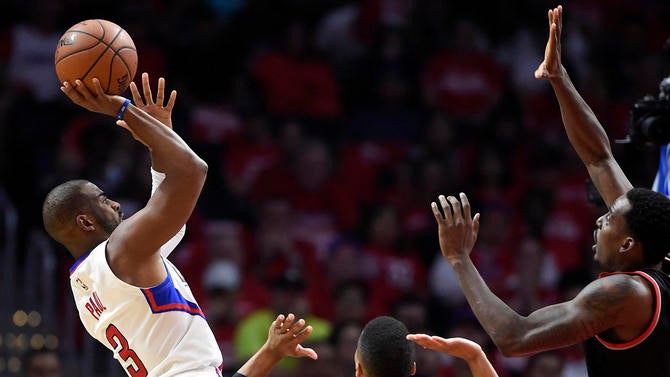
AN OMINOUS FUTURE
Karl Malone has been retired for just over a decade and yet, in terms of conversations about the greats of the game, he has already been largely forgotten. Malone is second all-time in points, made three Finals, and he was a Hall of Fame player on a Western Conference powerhouse for 17 straight seasons -- which included 11 seasons with 50 or more wins.
Charles Barkley was an MVP-caliber player over a 10-year span and provided Michael Jordan maybe the stiffest competition he ever faced in a Finals. He was an 11-time All-Star and an 11-time All-NBA selection. He's more known for his outrageous commentary on "Inside the NBA" than his stellar career.
John Stockton is the all-time steals leader and his record of 15,806 assists may never be touched. He's a 10-time All-Star, an 11-time All-NBA selection, and a five-time All-Defense selection. While discussed as one of the all-time great point guards, he's often mentioned after Magic Johnson, Jason Kidd and Isiah Thomas -- all of which have won titles.
Malone, Barkley and Stockton are, of course, without a title, and have been judged accordingly.
This is likely where we're headed with Paul, who will turn 32 during next year's playoffs. We keep expecting the window to close but he has kept it open. The knee injuries were supposed to precipitate a decline, but the adaptation of his game and constant work with his body have kept him at an elite level.
Still, he's going to fall off eventually, and this year is as ripe as any for that to happen. There are questions about the Clippers' chemistry. Blake Griffin trade rumors have persisted, though the Clippers have consistently pledged their allegiance to him. Either way, next summer Griffin will be a free agent, as will Paul and J.J. Redick. This Clippers team is pretty clearly on the clock.
Next summer, Paul may have to choose between trying to ride it out as the best player on a squad that may never win a title, or going the Gary Payton route of jumping on a super-team. The current financial climate doesn't help matters. Does Paul want to sacrifice literally tens of millions to go join the Cavaliers and potentially slide Kyrie Irving to the 2-guard? Would joining Dwyane Wade (were he to leave Chicago) and Carmelo Anthony (in New York or elsewhere) for a sort of banana-boat-brothers reunion get him a title, given where all three players are in their careers, and with the Warriors looming over everything?
This year's Finals -- which were supposed to be a forgone conclusion as a cap to the Warriors' record season -- proved that the future is not set in stone, that probability does not equal inevitability. Sports has always underscored the random, wild swings that can shift fates and franchises in an instant.
But from where we stand in August of 2016, Chris Paul is getting older, the Clippers' run with this core may be reaching its end for a lot of reasons, the Warriors just got Kevin Durant, and there's still the defending champion Cavaliers on the other side. With a league that has stratified more than ever with the Warriors' ascension, there will inevitably be players squeezed out. The same thing happened in the 80s with the dominance of the Lakers and Celtics (though the Sixers did win the title in 1983) and again in the 90s with the Jordan Era. The stars that lived in the shadows of those teams and players are only getting dimmer.
Paul is at risk for falling into that wide, deep, dark canyon of history. His only option is to put together his best season, at age 32, and rise against what seem at this point to be insurmountable odds. That a player of his caliber is faced with that crisis indicates the strength of this NBA era -- which will provide Paul with no share of comfort.










